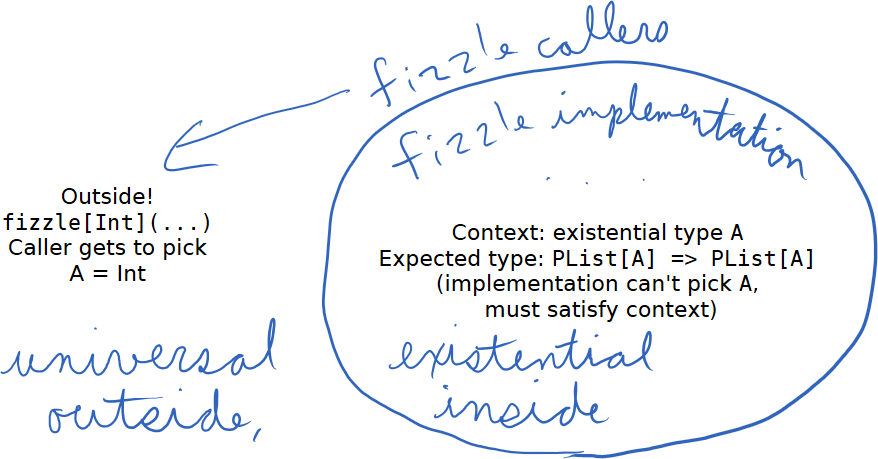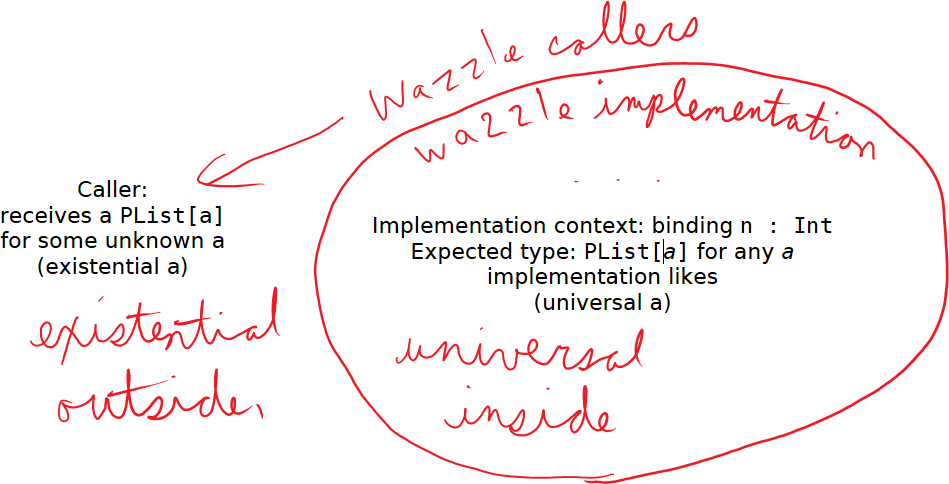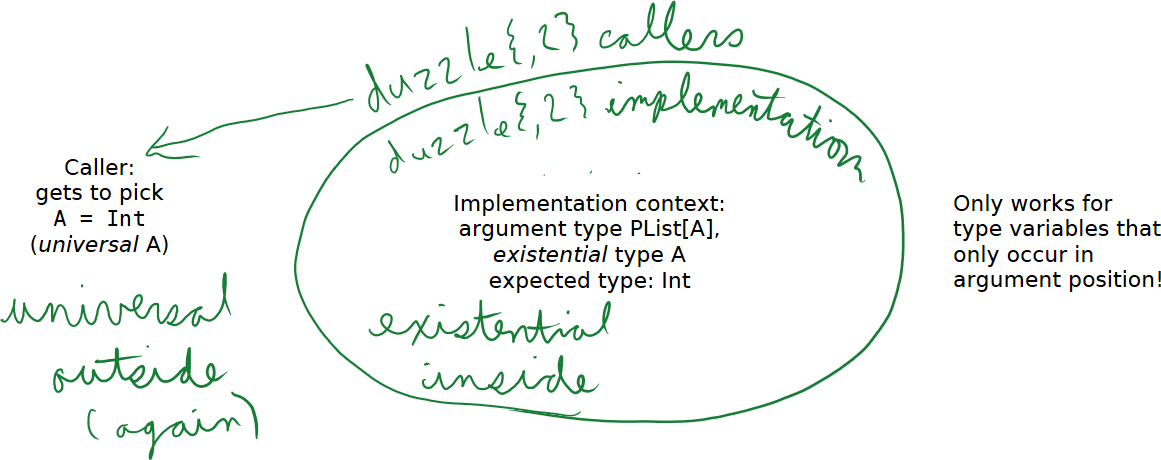It’s existential on the inside
by Stephen Compall on Jan 28, 2016
technical
This is the eighth of a series of articles on “Type Parameters and
Type Members”. You may wish to
check out the beginning,
which introduces the PList type we refer to throughout this article
without further ado.
When you start working with type parameters, nothing makes it immediately apparent that you are working with universal and existential types at the same time. It is literally a matter of perspective.
I will momentarily set aside a lengthy explanation of what this means, in favor of some diagrams.
Universal outside, existential inside
def fizzle[A]: PList[A] => PList[A] = {
def rec(pl: PList[A], tl: PList[A]): PList[A] = tl match {
case PNil() => pl
case PCons(x, xs) => rec(PCons(x, pl), xs)
}
xs => rec(PNil(), xs)
}

The caller can select any A, but the implementation must work with
whatever A the caller chooses. So fizzle is universal in A from
the outside, but existential in A from the inside.
So what happens when the caller and callee ‘trade places’?
Existential outside, universal inside
def wazzle: Int => PList[_] =
n => if (n <= 0) PCons(42, PNil())
else PCons("hi", PNil())

Now the implementation gets to choose an A, and the caller must work
with whatever A the implementation chooses. So wazzle is universal
in A from the inside, but existential in A from the outside.
A good way to think about these two, fizzle and wazzle, is that
fizzle takes a type argument from the caller, but wazzle
returns a type (alongside the list) to the caller.
Universal (!) outside, existential inside
def duzzle[A]: PList[A] => Int = {
case PNil() => 0
case PCons(_, xs) => 1 + duzzle(xs)
}
def duzzle2: PList[_] => Int = {
case PNil() => 0
case PCons(_, xs) => 1 + duzzle2(xs)
}

wazzle “returns” a type, alongside the list, because the existential
appears as part of the return type. However, duzzle2 places the
existential in argument position. So, as with all type-parameterized
cases, duzzle among them, this is one where the caller determines
the type.
We’ve discussed how you can
prove that duzzle ≡m duzzle2, in a
previous post. Now, it’s time to see why.
Type parameters are parameters
The caller chooses the value of a type parameter. It also chooses the value of normal parameters. So, it makes sense to treat them the same.
Let’s try to look at fizzle’s type this way.
[A] => PList[A] => PList[A]
Existential types are pairs
If wazzle returns a type and a value, it makes sense to treat them
as a returned pair.
Let’s look at wazzle’s type this way.
Int => ([A], PList[A])
This corresponds exactly to the forSome scope
we have explored previously.
So we can interpret PList[PList[_]] as follows.
PList[PList[A] forSome {type A}] // explicitly scoped
PList[([A], PList[A])] // “paired”
The duzzles are currying
With these two models, we can finally get to the bottom of
duzzle ≡m duzzle2. Here are their
types, rewritten in the forms we’ve just seen.
[A] => List[A] => Int
([A], List[A]) => Int
Recognize that? They’re just the curried and uncurried forms of the same function type.
You can also see why the same type change will not work for wazzle.
Int => ([A], List[A])
[A] => Int => List[A]
We’ve moved part of the return type into an argument, which is…not the same.
The future of types?
This formulation of universal and existential types is due to dependently-typed systems, in which they are “dependent functions” and “dependent pairs”, respectively, though with significantly more expressive power than we’re working with here. They come by way of the description of the Quest programming language in “Typeful Programming” by Luca Cardelli, which shows in a clear, syntactic way that the dependent view of universal and existential types is perfectly cromulent to non-dependent type systems like Scala’s.
It is also the root of my frustration that Scala doesn’t support a
forAll, like forSome but for universally-quantified types. After
all, you can’t work with one without the other.
Now we have enough groundwork for “Making internal state functional”, the next part of this series. I suspect it will be a little prosaic at this point, though.
